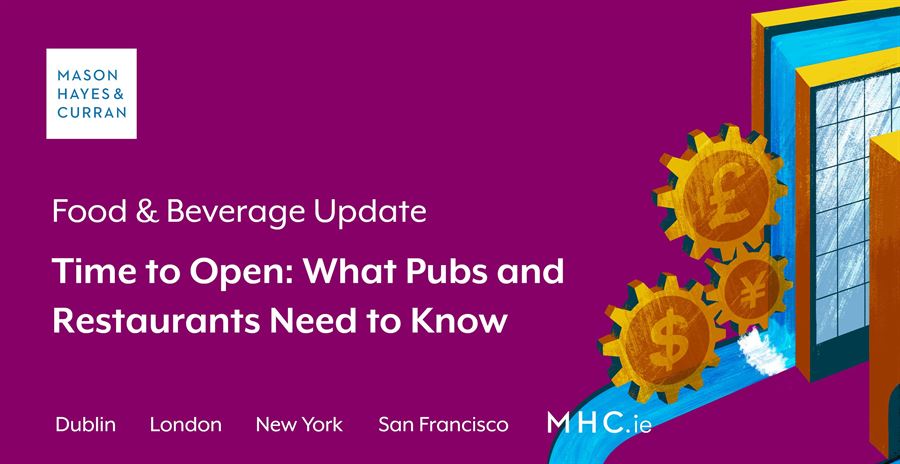Time to Open: What Pubs and Restaurants Need to Know

We now have the benefit of Fáilte Ireland (FI) guidelines on re-opening of pubs and restaurants, which have issued a matter of days before the revised opening date of 29 June 2020. Business owners in the hospitality sector now face the time and cost challenge of making their premises compliant. We review some of the key issues that need to be considered.
Food guidelines
The FI guidelines state that pubs should be required to serve a ‘substantial’ meal – defined as “[a] meal as might be expected to be served as a main midday or evening meal or as a main course in either such meal” (Intoxicating Liquor Act 1962). The reasonable amount to charge for such a meal should not be less than €9. Any food offerings less than this amount could result in the premises being non-compliant with the guidelines.
Pubs must also have a Food Safety Management System in place based on the principles of HACCP (ISO 340/2007), which is already a requirement in law. The FI guidelines state that while finger food can be served on a per table basis, they are not to be served as catering platters to larger groups. Menus must be single use or made of a material that can be easily cleaned after use.
 Cleaning
Cleaning
Pubs, acting as food business operators, will be required to introduce COVID-19 safety management systems in the form of enhanced hygiene, cleaning and disinfection, staff training and health checks – in addition to physical distancing. The FI guidelines state that contact/touch surfaces should be cleaned and disinfected at least twice daily. Hand sanitisers, touchless where possible and with a minimum alcohol content of 60%, must be available at all public entrances, employee entrances and at specific points within the public areas of the premises.
The FI guidelines also state that ahead of re-opening, the cleaning of beer lines should be arranged together with any required notice to be made to breweries or suppliers.
Any of these precautions must not compromise food safety. For guidelines on food safety visit the Food Safety Authority of Ireland website: www.fsai.ie.
Physical distancing
The physical distancing requirement of 2 metres remains in place. Business owners will need to take a good look at their premises and see what needs to be reconfigured to accommodate this. There are various fit-out consultants in the market who could assist if large scale changes are required in terms of space management. From a legal perspective, remember that unless you own the freehold you may need prior written landlord consent under your lease depending on what restrictions on alterations are contained in your lease. If works are being carried out, also consider if you need an architect’s opinion to determine if planning permission is required or any impact on building regulations – in particular your fire safety certificate or disability access certificate.
The FI guidelines do state that if physical distancing of 2 metres is not possible that this can be reduced to 1 metre in ‘controlled environments’ (which includes restaurants and cafes but not pubs) if certain risk mitigation requirements are taken into account. These are detailed in the appendix to the guidelines.
Communal areas including entrances, stairs and toilets, etc. must have systems to avoid congregation of people and must have appropriate COVID-19 signage display via screens or monitors where possible.
They further state that as far as reasonably possible, a distance of 2 metres and a minimum of 1 metre should be maintained between employees. Face coverings should be implemented where it is difficult to practice physical distancing as per Irish Government guidelines and must be made available to employees.
Seating guidelines
Pre-booked time limited slots should be in place for customers – being a maximum of 105 minutes duration. There should also be 15 minute windows between bookings to allow for adequate cleaning and allow customers leave and enter without mixing.
The FI guidelines confirm the 2 metres requirement does not apply to members of the same household. A designated employee should be stationed at the front of house to control physical distancing measures. Customers should be seated at a table except when using the toilet, paying or departing. Peak-period queuing procedures must be implemented if customers can’t be seated immediately.
Smoking areas must be reviewed by business owners to ensure seating is reduced to facilitate social distancing guidelines.
Staff guidelines
A COVID-19 response team or coordinator must be appointed to ensure the new procedures are adhered to. The person(s) must receive the necessary training and have a structured action plan to follow to prevent the spread of the virus, which should include COVID-19 induction training for the return of employees (see www.hsa.ie). It should also include procedures for when a suspected case of COVID-19 is identified among customers and/or employees. The action plan and procedures must be shared with employees prior to their return to work. The FI guidelines encourage a collaborative approach between the coordinator and employees.
Where possible, there should also be an isolation area designated where any customer or employee showing symptoms can be isolated from other people and then travel to seek medical attention elsewhere.
Consequence of non-compliance with the Failte Ireland guidelines
Similar to the government guidelines there is currently no express enforcement legislation in place to make pubs or restaurants comply with these FI guidelines. The purpose of them is to assist business owners maintain the safety of the public and their employees while allowing them re-open to trade.
However, existing legislation governing food safety must still be borne in mind and the HSE and FSAI continue to have an enforcement role in that regard. It will also be interesting to see how the HSE and Gardai interact going forward where a particular premises is not trading in compliance with the guidelines. Consequences of non-compliance could include the Gardai objecting to the renewal of the liquor licences currently benefitting the premises in September/October (Annual District Court licensing sessions).
Conclusion
From a commercial perspective, social distancing means less customers, which will impact revenues. The implementation of these guidelines is a challenge for business owners and the HSE to ensure they work in practice where commercial premises often differ in size, location and footfall.
There has been some negative feedback received on the FI guidelines already on the basis that pubs and restaurants often have different considerations when dealing with customers and should not be subject to the same rules. Some publicans also argue they should not have to serve food to be able to open on 29 June.
A balance will have to be achieved when assessing compliance with these guidelines to protect the public but to avoid decimating trade for any particular business.
There is also an onus on the public to make responsible decisions when determining which pubs or restaurants to attend (if it is clear the guidelines are not being followed).
The Irish economy relies on these businesses to support tourism and to maintain healthy levels of employment, which following 29 June 2020 should have positive knock-on effects for many other sectors.
For more information, contact a member of our Food, Agriculture & Beverage or Real Estate teams.
The content of this article is provided for information purposes only and does not constitute legal or other advice.
Share this:


